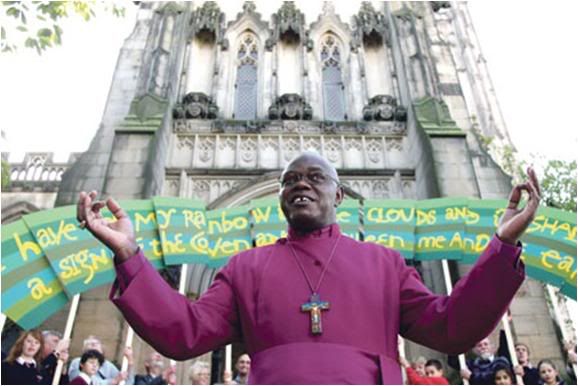 Senior Anglican leader
Senior Anglican leader
dismisses Pope’s offer
By Anna Arco

12 February 2010
 The Archbishop of York in front of Manchester Cathedral.
The Archbishop of York in front of Manchester Cathedral.
The Archbishop of York has suggested that Anglicans hoping to take up the Pope's offer would not be "proper Catholics".
Dr John Sentamu, the second most senior figure in the Church of England, told a reporter for the BBC: "If people genuinely realise that they want to be Roman Catholic, they should convert properly, and go through catechesis and be made proper Catholics."
He said: "This kind of creation [the Apostolic Constitution] - well, all I can say is, we wish them every blessing and may the Lord encourage them. But as far as I am concerned, if I was really, genuinely wanting to convert, I wouldn't go into an ordinariate. I would actually go into catechesis and become a truly converted Roman Catholic and be accepted."
He also said that if he were a Catholic bishop he would have a number of questions to ask of a "group within my diocese being looked after by an Ordinariate whose reference was back to the Vatican".
The Bishop of Ebbsfleet, Rt Rev Andrew Burnham, one of the Anglican bishops considering the Pope's offer, said the Catholic Church was far more complicated than Dr Sentamu acknowledged.
He pointed out that Catholic bishops often have groups of people in their dioceses belonging to other jurisdictions, such as religious orders, military dioceses and the personal prelatures of Opus Dei. The Personal Ordinariates proposed in the Pope's decree
Anglicanorum coetibus would differ from the personal prelatures in that the laity would fall under the jurisdiction of the leader of an ordinariate.
Bishop Burnham, who is one of the bishops who ministers to Anglo-Catholics who cannot in good conscience accept women priests, said that, while catechesis and a genuine desire to be in communion with Rome were necessary for Anglicans taking up the Pope's offer, Dr Sentamu underestimated how close Anglo-Catholics were in belief to the Catholic Church.
Anglo-Catholic blogger Fr Edward Tomlinson SCC rejected the idea that Ordinariates made Anglo-Catholics taking up
Anglicanorum coetibus second-class citizens.
He also suggested that while the beginning of a Personal Ordinariate in Britain would be small, consisting of some 20 parishes, hesitant Anglo-Catholics might be drawn to an ordinariate once it has been established.
Dr Sentamu's comments came shortly before the Bishop of Manchester put a dampener on the hopes of some traditionalist Anglicans that an alternative legal structure might be found within the Church of England so they would not have to accept women bishops.
The Rt Rev Nigel McCulloch, who is in charge of the group drafting legislation for women bishops, told the General Synod on Monday to expect the legislation to follow a model where diocesan bishops would delegate ministry to groups who objected to women bishops to a suffragan bishop. This will be presented at the General Synod in July.
Traditionalists - both evangelical and Anglo-Catholics - had hoped for a structure in which they would fall under the jurisdiction of a society or a new diocese.
The model being proposed would abolish the flying bishops - as the Provincial Episcopal Visitors who minister to parishes who cannot in conscience accept women priests are called - and parishes which fall under the jurisdiction of a woman bishop would be ministered to by a male delegate of the woman bishop.
The discussion of legislation for women bishops has been moved to July because the revision committee was inundated by hundreds of suggestions.
He said they had created a traffic light system by which some suggestions were given red lights or amber lights and that the committee had rejected the proposal to create additional dioceses in the summer.
He said: "But proposals for a recognised society, some sort of transfer or vesting, or for adopting the simplest possible legislative approach all got initial amber lights - that is, we agreed to consider them further.
"This meant that after more than six months' work we had rejected all the options which would have involved conferring some measure of jurisdiction on someone other than the diocesan bishop."
Earlier this month, Anglo-Catholic leaders pushed back the date on which they would ask their flock to make a decision in response to the Pope's provision for groups of Anglicans coming into full communion with the Church.
Bishop Burnham said the date, originally February 22, would constitute a day of prayer and reflection but he said he would ask his flock to make a decision only after the General Synod had discussed legislation proposed by the revision committee.
Since the discussion has been moved to July, the bishop said he would also move the day on which the response is to be made.
But he said decisions on Anglicanorum coetibus should not be dependent on what the General Synod would do.
Bishop Burnham has been accused of backtracking on earlier statements welcoming the offer made in the Apostolic constitution Anglicanorum coetibus last year.
The decree offered Anglicans wishing to be in full communion with the Church a new canonical structure known as a Personal Ordinariate, similar in structure to military dioceses.
But friends of the bishop believe pastoral concerns have also contributed to the later date at which an official announcement is made.
They think the bishop feels it is necessary to wait for a critical mass of people willing to join a Personal Ordinariate before making a move and that some people would not make up their minds until they were faced with the reality of the General Synod's decision.
Other traditionalist Anglicans in Bishop Burnham's flock who have decided to stay in the Church of England want those who are considering taking up the Pope's offer not to rock the boat until the General Synod has a chance to make provisions for them.